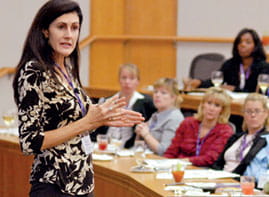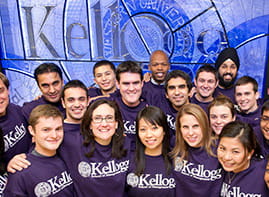12/1/2014 -
Editor's note: In the Start Me Up series, the Kellogg School spotlights young members of the Kellogg community who are bringing bold entrepreneurial visions to life.
Adam Louras ’11 always considered himself a fit, healthy person. That’s why he was surprised when, at age 30, his doctor told him he was pre-diabetic.
While attending Kellogg, Louras maintained a hectic schedule that often meant substituting juice smoothies for traditional meals. While Louras thought that he was making a healthier choice than chips or cookies, the smoothies were loaded with sugar.
“There had to be some way around this,” recalled Louras. “Juice is good in moderation, but I wanted something that would be nutrition-dense. No sugar, no carbs. Actually good for you.”
Now 34 and living in Dallas, Louras is founder and chief executive of Koa Organic Beverages, a beverage company that produces and bottles
olakino, which is Hawaiian for the vitamin-packed, sugar-free juice that can be pressed from fruits and vegetables. Think of a “skim milk” version of juice and you have the right idea.
Louras recently launched Koa Natural Olakino at select retailers across the country, including the Four Seasons and Ritz-Carlton hotels as well as Dean & Deluca, a upscale grocery store chain.
Building the Black Box
The first olakino Louras sampled was almost translucent, a little hazy, and had the slight smell and taste of oranges. Louras had the olakino tested and discovered it was full of vitamins, minerals and polyphenols, a natural antioxidant found in juices. “I knew I had something really special,” Louras said.
In its raw state, olakino, like fresh fruit, deteriorates quickly. Louras had to find a way to give it a reasonable shelf life without adding preservatives.
Louras researched different techniques, borrowing from those used in winemaking, water filtration, olive oil pressing and milk separation. He also turned to Rocky Alfinger, an accounts manager at Ultrapure & Industrial Services, which normally produces extremely high-purity water for hospitals and high-end bottled water companies. Alfinger helped develop the proprietary “black box” processing technology that became the final step for Koa.
“Normally, the process for cleaning water is reverse osmosis,” said Alfinger. “You are separating what we call the ‘bad stuff’ — minerals, etc. — from the water and keeping the rest. With juice, we needed to do the opposite — the minerals
are the good stuff. It was a really fun challenge.”
Alfinger took technology that is normally used in microconductor and semiconductor applications and modified it based on Louras’ research. The result was an olakino pressed from fruits and vegetables like pomegranate, orange, guava, holy basil, red sea lettuce and heirloom carrots. The juice was sugar-free and nutrient-rich with a six-month shelf life and only the slightest hint of fruit.
A Kellogg edge also helped Louras solve another puzzle. While shopping in a Michaels Arts & Crafts, Louras came across an uncommon plastic shape he wanted for Koa’s packaging. Knowing it was a long shot, Louras reached out to an alumnus working at Michaels.
“Within 48 hours, I had a call on my cell phone from China and I was talking with the owner of the company that made the bottle!” said Louras.
Indeed, Louras says his time at Kellogg was instrumental in realizing his dream for Koa, from brainstorming with classmates and shaping a business plan on campus, to receiving investment funds from classmates and their families.
He even convinced Andrew Razeghi, an adjunct marketing lecturer, to invest. Louras worked on developing Koa while taking Razeghi’s innovation class. “Now he’s an owner and a member of our board of directors,” Louras said.
Zero waste
But Koa’s focus on being good goes beyond the bottle. In addition to using the world’s first fully biodegradable bottle — including the cap, freshness sticker, label and enzyme embedded plastic — Koa also helps cut down existing food waste.
Typically, orange crops are sold in “fractions,” with each buyer purchasing just the element of the fruit they need (the meat, the pulp, the oils and essence). A barbecue sauce company, for example, might buy thousands of tons of orange rind to make its product.
Koa negotiated with these companies to buy the unneeded olakino, which might otherwise be discarded, to make its beverage.
And Koa keeps it local. Currently, everything is sourced close to their bottling plant in Ramona, Calif., but the ultimate goal is to have a local source for every location they have. “It just always made sense,” said Louras. “We stay close to the fruit.”
Read more in the Start Me Up series:
- Songhua Hu ’10 and Richard Lim ’10 help DIY your wedding bouquets with Bloominous
- Jen Moore '04 makes cooking dinner a piece of cake with Meez Meals
- Chris Motley ’11 helps job seekers and companies meet their match at Better Weekdays
- Elaine Russell '09 demystifies jewelry buying with Heirlumé






